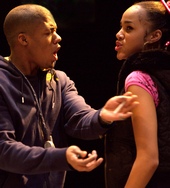SITE GUIDE
SEARCH
REVIEWS
REVIEW ARCHIVES
ADVERTISING AT CURTAINUP
FEATURES
NEWS
Etcetera and
Short Term Listings
LISTINGS
Broadway
Off-Broadway
NYC Restaurants
BOOKS and CDs
OTHER PLACES
Berkshires
London
California
New Jersey
DC
Philadelphia
Elsewhere
QUOTES
TKTS
PLAYWRIGHTS' ALBUMS
LETTERS TO EDITOR
FILM
LINKS
MISCELLANEOUS
Free Updates
Masthead
Writing for Us
A CurtainUp  London Review
London Review
 London Review
London ReviewGone Too Far!
|
You don't know what to identify yourself with. Should you be on the white side, should you be on the black side — you don't know... You are SO confused!— Paris
|

Ashley Chin as Razer and Zawe Ashton as Armani
(Photo: Marc Brenner) |
Gone Too Far! has an almost picaresque scenario and a deceptively simple plot. Two brothers, one brought up in Nigeria and one on a London council estate, go on a mission to buy a pint of milk. As they cross the estate, they encounter other teenagers, a protective Bangladeshi shopkeeper and an elderly woman terrified of the brothers.
The characters are engaging and flawed, giving a compassionate core to this play and are played with aplomb by a mainly young cast. Tobi Bakare is the likeable Yemi, an adrift teenager of Nigerian origin and London values. Other characters include his brother Ikudayisi (Tunji Lucas) who has a more grounded sense of identity, Flamer (Marcus Onilude), who is powerful in the tribal politics of the estate but also has a stable pragmatism, the confrontational firebrand Armani (Zawe Ashton) and her gentler, sensible friend Paris (Bunmi Mojekwu).
The teenagers bandy prejudices and misconceptions, discussing identity, ancestry and self-knowledge. Talking from within their own limited perspectives, we have a fairly naturalistic exploration of the themes of diversity and conformity. The pressure to fit in contradicts their own uniqueness, as Yemi states, "In order to get along on this estate, in this country, you need to stop being you." From this debate emerges a relatively simplistic, if pertinent, message: that you can only be free if you embrace own unique heritage.
Reflecting the energetic writing are interludes of modern dance, in-between the scenes of dialogue. In an exciting piece of direction, these are speechless, choreographed movements of swagger, violence and suspicion. Mimicking fights in a shadowy world, they replay the dynamics of the previous scene and extend the portrayal of the characters' emotions.
This lively, well-directed piece is certainly relevant to today's society, not least because of the current preoccupation with knife crime in London. Showcasing characters created with affection and an eye for realism, Agabje's play about individualism reaches the verge of tragedy, only to rein in the violence and recklessness and end on an ultimately redemptive and hopeful message.
|
Gone Too Far!
Written by Bolas Agbaje Directed by Bijan Sheibani With: Zawe Ashton, Tobi Bakare, Maria Charles, Ashley Chin, Phillip Edgerley, Munir Khairdin, Tunji Lucas, Ricci McLeod, Bunmi Mojekwu, Marcus Onilude Design: James Cotterill Lighting: Nicki Brown Sound: Emma Laxton Choreography: Aline David Running time: 1 hour 25 minutes with no interval Box Office: 020 7565 5000 Booking to 9th August 2008 at the Royal Court then at other venues in London to 23rd August 2008 Following its run at the Royal Court, Gone Too Far! will be presented at The Albany in Deptford 14th — 16th August 2008 and at Hackney Empire 19th— 23rd August 2008 Reviewed by Charlotte Loveridge based on 28th July 2008 performance at The Royal Court Theatre, Sloane Square, London SW1 (Tube: Sloane Square) |
|
REVIEW FEEDBACK Highlight one of the responses below and click "copy" or"CTRL+C"
Paste the highlighted text into the subject line (CTRL+ V): Feel free to add detailed comments in the body of the email and state if you'd like your comments published in our letters section. |
|
London Theatre Tickets Lion King Tickets Billy Elliot Tickets Mighty Boosh Tickets Mamma Mia Tickets We Will Rock You Tickets Theatre Tickets |




